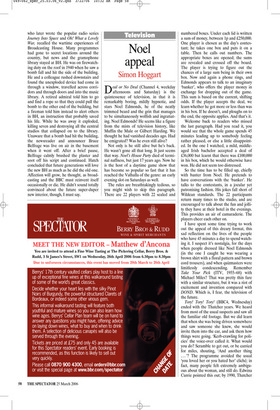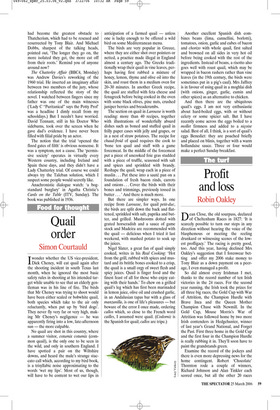Noel appeal
Simon Hoggart
Deal or No Deal (Channel 4, weekday afternoons and Saturday) is the quintessence of television, in that it is remarkably boring, mildly hypnotic, and stars Noel Edmonds, he of the neatly trimmed beard and the grin that manages to be simultaneously wolfish and ingratiating. Noel Edmonds! He seems like a figure from the mists of television history, like Muffin the Mule or Gilbert Harding. We thought he had vanished decades ago. Had he emigrated? Was he even still alive?
Not only is he still alive but he’s back. He wasn’t gone all that long. It just seems that way. Noel’s House Party died of terminal naffness, but just 17 years ago. Now he is the host of a daytime game show that has become so popular so fast that it has reached the Valhalla of the genre: an early evening slot on Saturdays as well.
The rules are breathtakingly tedious, so you might wish to skip this paragraph. There are 22 players with 22 sealed and numbered boxes. Under each lid is written a sum of money, between 1p and £250,000. One player is chosen as the day’s contestant; he takes one box and puts it on a table. Then he calls out numbers. The appropriate boxes are opened; the sums are revealed and crossed off the board. The player is trying to figure out the chances of a large sum being in their own box. Now and again a phone rings, and Edmonds appears to talk to an imaginary ‘banker’, who offers the player money in exchange for dropping out of the game. This sum is based on the current, shifting odds. If the player accepts the deal, we learn whether he got more or less than was in his box. If he doesn’t, and ploughs on to the end, the opposite applies. And that’s it.
Welcome back to readers who missed the last paragraph. Had you read it, you would see that the whole game spends 45 minutes leading up to somebody feeling rather pleased, or else a little disappointed. In the one I watched, a mild, middleaged Irish bachelor accepted a deal of £36,000 but learnt that there was £100,000 in his box, which he would otherwise have won. He did not seem too distressed.
So the time has to be filled up, chiefly with banter from Noel. He pretends to have conversations with the ‘banker’. He talks to the contestants, in a jocular yet patronising fashion. His jokes fall short of Wildean standards. The 22 participants return many times to the studio, and are encouraged to talk about the fun and jollity they have at their hotel in the evenings. This provides an air of camaraderie. The players cheer each other on.
I have spent some time trying to work out the appeal of this dreary format, this sad reflection on the lives of the people who have 45 minutes a day to spend watching it. I suspect it’s nostalgia, for the days when people dressed like Noel Edmonds (in the one I caught he was wearing a brown shirt with a floral pattern and brown cord trousers), and when quizmasters were limitlessly condescending. Remember Take Your Pick (ITV, 1955–68) with Michael Miles? That was pretty thin fare with a similar structure, but it was a riot of excitement and invention compared with DOND. Which is, I fear, the television of the future.
Tory! Tory! Tory! (BBC4, Wednesday) ended with the Thatcher years. We heard from most of the usual suspects and saw all the familiar old footage. But we did learn that when she was being driven somewhere and saw someone she knew, she would invite them into the car, and ask them how things were going. ‘Kerb-crawling for policies’ the voice-over called it. What would you do? Scramble to get out, or be carried for miles, shouting, ‘And another thing ... ’? The programme avoided the usual ‘you loved her or you hated her’ cliché; in fact, many people felt extremely ambiguous about the woman, and still do. Edwina Currie pointed this out; by 1990, Thatcher had become the greatest obstacle to Thatcherism, which had to be rescued and resurrected by Tony Blair. And Michael Dobbs, sharpest of the talking heads, pointed out, ‘The longer they go on, the more isolated they get, the more cut off from their roots.’ Remind you of anyone around now?
The Chatterley Affair (BBC4, Monday) was Andrew Davies’s reworking of the 1960 trial. He inserted an imaginary affair between two members of the jury, whose relationship reflected the story of the novel. I watched between fingers since my father was one of the main witnesses (‘Lady C “Puritanical” says the Potty Prof’ was a headline I dimly recall from my schooldays.) But I needn’t have worried. David Tennant, still in his Doctor Who sideburns, took over the screen when he gave dad’s evidence. I have never been filled with filial pride by an actor.
The notion that the trial ‘opened the flood gates of filth’ is obvious nonsense. It was a symptom, not a cause. The ‘permissive society’ operates in virtually every Western country, including Ireland and Spain these days, and they didn’t have a Lady Chatterley trial. Of course we could always try the Taleban solution, which I suspect some people would secretly like.
Anachronistic dialogue watch: ‘a bogstandard burglary’ in Agatha Christie’s Cards on the Table (ITV, Sunday). The book was published in 1936.
























































 Previous page
Previous page